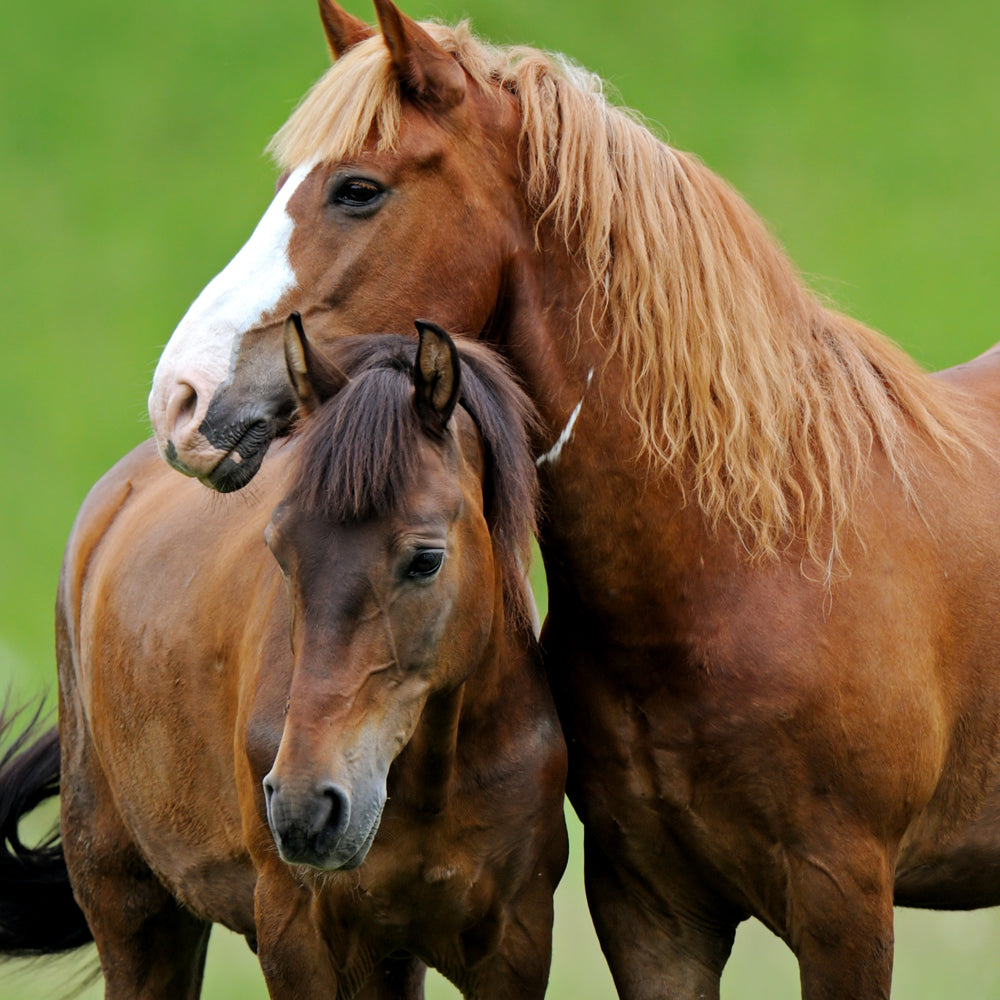
Article Detail
09 Oct
In 1989, the Bureau of Land Management shipped 1500 wild horses to my ranch in South Dakota, the first government-sponsored wild horse sanctuary. These were “unadoptables,” the horses that the public did not want to adopt. Many were one-eyed, crippled, scarred, and just plain old. But some of the horses were young, and some of them even beautiful.One horse in particular stood out in the herd. He was a strong black and white paint about 18 hands tall. He had white fetlocks and a white tail. A splotch of white swopped from mid-neck down around his shoulders, almost to his belly. If it had been further back, it would have looked exactly like a white saddle. A white streak ran the length of his nose. The rest of him was pitch black. We named him Happy for his demeanor.
Happy preferred to hang out on the periphery of the herd, rather than in a family unit like the majority of horses belonged to. Maybe his coloring make him a pariah among his peers or maybe something inside him, a feeling of uniqueness or the desire to be a loner, pushed him to the edge of his community. If he had been human, he might have chosen to live off the grid or explore the world alone, a backpack his only possession. He was the philosopher, the Thoreau of the horses, who galloped to the beat of his own drum. But he did it with a smile and a sense of contentment.
Almost every visitor at the ranch commented on him. The BLM reps that visited quarterly even knew him. “Happy’s looking good,” they would say. When I rode out to check on the herd, Happy always landed on my radar first. If I rode within a few feet of him, close, he would raise his head and chew a hello. He never invited being petted or loved on, but I believe he loved us in his own way.
One time while the cowboys and I moved the herd across the Little White Rive, Happy decided to meander upstream and splash in the fresh water. When I went to gather him, he willingly obliged, a twinkle in his eye and a grin and his face. “You’re a funny guy,” I said to him.
Out of the blue, the BLM, an agency always scouting for positive publicity, decided they wanted Happy as their poster child. Someone had the brilliant idea of sprucing up the Flathead Lake area of Montana, a remote but popular fishing area.
The lake had a large island, named Wild Horse Island, and this dreamer envisioned making fishermen and tourists very happy by showcasing a painted mustang on the island.
“Are you telling me you’re deporting Happy to an island in some godforsaken northern part of Montana?” I said to the BLM rep on the phone, who had just told me about the absurd plan. I tried arguing but to no avail. By contract, the BLM had the power to do anything they wanted with the horses. They owned them all.
On the appointed day, a BLM rep drove to the ranch. I loaded Happy into the trailer. He didn’t argue, but once inside, he shook his head like he was trying to clear out confusion. Or maybe a bad memory of being shipped on the road. I hoped not. I wanted him always to be happy. Maybe going to a remote island was his destiny and he had been preparing for it by being a loner on the ranch. Take it easy, I told the driver.
Years later I met some people who talked about fishing on Flathead Lake. I asked if by chance they had seen a black-and-white paint, a big horse, on the island in the middle of that coldwater lake. They had not. Knowing Happy, he probably chose to hang out in the middle of the island as far away from humans as possible. For all I know maybe he’s still hanging around. In my daydream, I envision him there, noble and regal as ever, smiling to himself over the follies of mankind.
Happy preferred to hang out on the periphery of the herd, rather than in a family unit like the majority of horses belonged to. Maybe his coloring make him a pariah among his peers or maybe something inside him, a feeling of uniqueness or the desire to be a loner, pushed him to the edge of his community. If he had been human, he might have chosen to live off the grid or explore the world alone, a backpack his only possession. He was the philosopher, the Thoreau of the horses, who galloped to the beat of his own drum. But he did it with a smile and a sense of contentment.
Almost every visitor at the ranch commented on him. The BLM reps that visited quarterly even knew him. “Happy’s looking good,” they would say. When I rode out to check on the herd, Happy always landed on my radar first. If I rode within a few feet of him, close, he would raise his head and chew a hello. He never invited being petted or loved on, but I believe he loved us in his own way.
One time while the cowboys and I moved the herd across the Little White Rive, Happy decided to meander upstream and splash in the fresh water. When I went to gather him, he willingly obliged, a twinkle in his eye and a grin and his face. “You’re a funny guy,” I said to him.
Out of the blue, the BLM, an agency always scouting for positive publicity, decided they wanted Happy as their poster child. Someone had the brilliant idea of sprucing up the Flathead Lake area of Montana, a remote but popular fishing area.
The lake had a large island, named Wild Horse Island, and this dreamer envisioned making fishermen and tourists very happy by showcasing a painted mustang on the island.
“Are you telling me you’re deporting Happy to an island in some godforsaken northern part of Montana?” I said to the BLM rep on the phone, who had just told me about the absurd plan. I tried arguing but to no avail. By contract, the BLM had the power to do anything they wanted with the horses. They owned them all.
On the appointed day, a BLM rep drove to the ranch. I loaded Happy into the trailer. He didn’t argue, but once inside, he shook his head like he was trying to clear out confusion. Or maybe a bad memory of being shipped on the road. I hoped not. I wanted him always to be happy. Maybe going to a remote island was his destiny and he had been preparing for it by being a loner on the ranch. Take it easy, I told the driver.
Years later I met some people who talked about fishing on Flathead Lake. I asked if by chance they had seen a black-and-white paint, a big horse, on the island in the middle of that coldwater lake. They had not. Knowing Happy, he probably chose to hang out in the middle of the island as far away from humans as possible. For all I know maybe he’s still hanging around. In my daydream, I envision him there, noble and regal as ever, smiling to himself over the follies of mankind.



